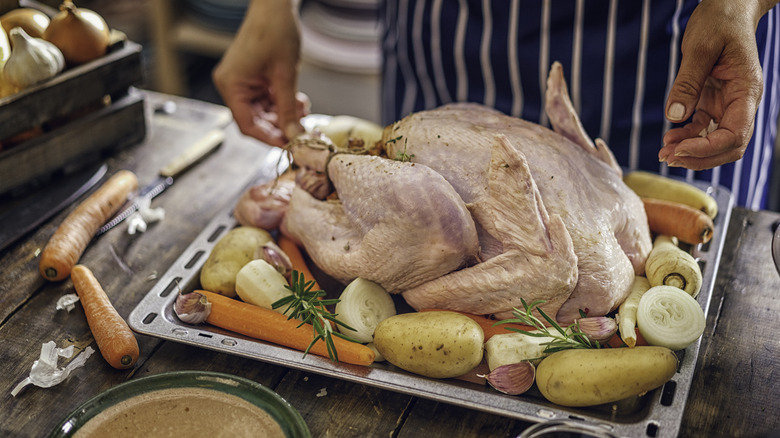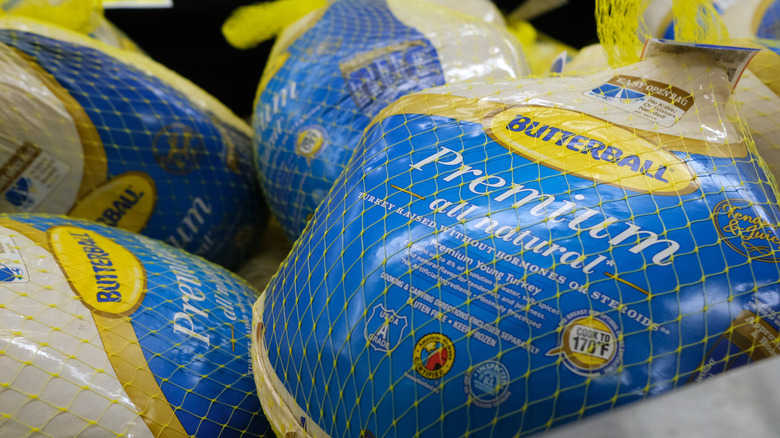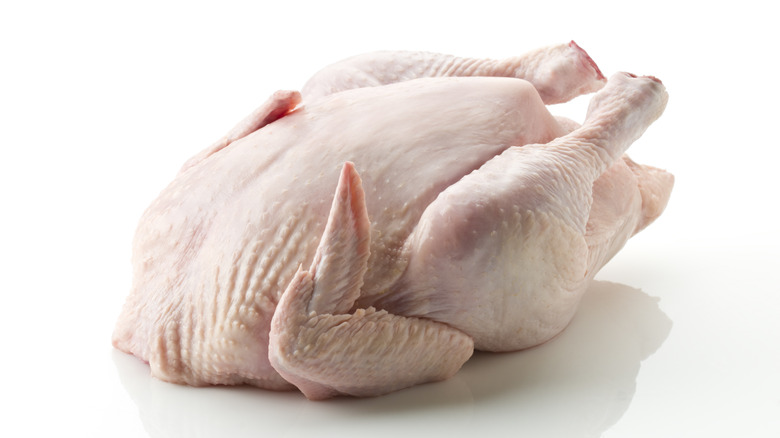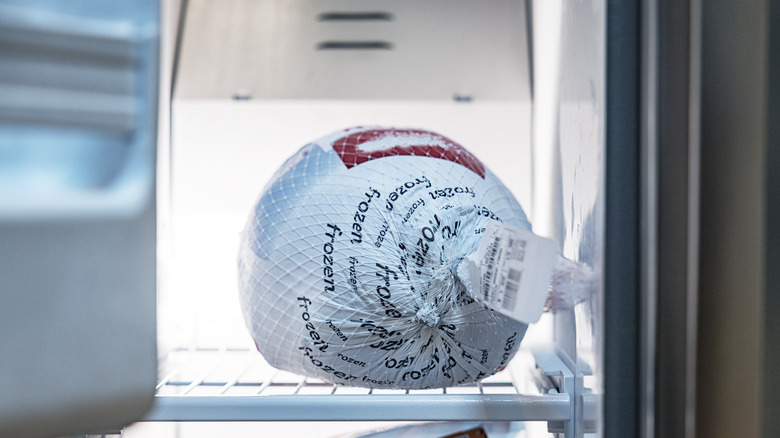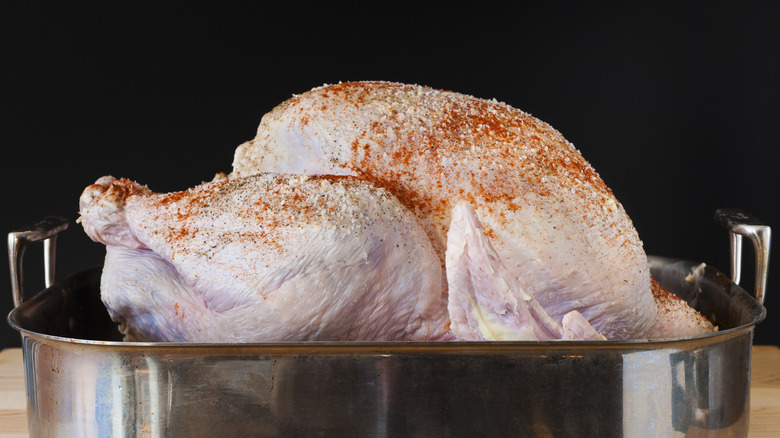Should You Really Buy A Frozen Turkey?
Thanksgiving is fast approaching. If you're the family's designated turkey cook, there's bound to be at least a little anxiety. It's stressful enough that Butterball — one of America's top turkey producers — offers a hotline for cooks looking for turkey tips. Even the government weighs in. The United States Department of Agriculture (USDA) suggests that overwhelmed cooks looking for food safety advice call the meat and poultry hotline at 1-888-MPHotline.
The stress starts before you even buy the bird. One common dilemma? The fresh versus frozen debate. But, while you might hear strong opinions from the sidelines on Thanksgiving day, there's no right answer. The best turkey is the turkey that fits your needs and priorities. If you've used the same technique for years, stick to what you know. You'll have enough to deal with on the big day without worrying about learning new techniques. Besides, Thanksgiving is all about tradition. If your traditions involve tossing the turkey in a chlorinated pool, so be it. Just don't tell the USDA.
If you're new to the game, you might assume fresh is best. But 90% of customers opt for frozen turkeys, and with good reason. A frozen bird doesn't necessarily mean compromising on flavor and sometimes it's the most practical choice. Take the time to educate yourself and decide what's best for you.
What are the advantages of a fresh turkey?
There is a consensus: Fresh turkeys have better texture. Frozen turkeys tend to be dry, no matter how much you baste them. When turkey is frozen, the moisture in the meat turns into ice crystals. When the crystals expand, they damage the meat's cellular structure. That moisture then seeps out from the damaged cells as the turkey thaws. Turkey meat is dry to begin with, so that loss of extra moisture makes a big difference.
Since fresh turkeys don't have to be thawed, they're a good choice for the forgetful among us. If you have a history of lost keys, missed appointments, and sky-high library fees, there's a chance you'll forget to take the bird out of the freezer in time for the big day. After all, frozen turkey takes some serious time management skills: A full-sized bird takes up to a week to defrost in the fridge. With fresh turkey, you're good to go as soon as you get home from the store.
If fresh is important to you, remember to check the packaging for disclaimers. Some turkeys are shipped frozen, then defrosted and sold in stores. Legally, the package should let you know. Look for terms like "thawed" or "previously frozen."
What are the advantages of a frozen turkey?
Sometimes, the best bird is a frozen bird. For one, frozen turkeys are cheap. In fact, many stores sell frozen turkeys at a loss to get customers through the doors. But cheap doesn't mean that they're bad quality. Often, frozen turkeys taste better than fresh. Turkeys are frozen soon after they're slaughtered, so they're preserved while the meat tastes its best. Unless you're down to kill a turkey in your own backyard, your 'fresh' bird won't actually taste as fresh as frozen.
The pros agree. The National Turkey Federation, a nonprofit that represents the turkey industry, states that there's no quality difference between fresh and frozen. But you don't have to trust Big Turkey and their frozen turkey agenda. Chefs like Alton Brown approve, too. Instead of thawing his water, Brown uses a vegetable stock brine to season the meat when it comes to temperature.
Looking to avoid the pre-Thanksgiving grocery store feeding frenzy? Opting for frozen will give you plenty of time to pick the perfect bird. Whole turkey lasts a long time in the freezer (indefinitely, according to the USDA). A premium turkey bought months in advance will taste better than the picked-over fresh fare you'll find 48 hours out. Just don't get carried away. 'Indefinitely' doesn't mean you should buy a bird to pass on to your as-yet-unborn grandkids, no matter how good the deal is. For the best quality, eat the meat within a year.
What are the disadvantages of fresh turkey?
If you opt for a fresh turkey, you'll be in a race against the clock. The USDA recommends buying fresh turkey just one or two days before you plan to serve it. That's a far cry from the indefinite shelf life of a frozen bird — and doesn't give you much time to shop.
Fresh turkey's actual shelf life is much longer: The meat lasts up to 21 days after the turkey is killed. So what's up with the 19 to 20 days in between? Packaging, transportation, stocking, and other logistics. By the time the birds reach the shelves, the only thing 'fresh' about them is that they're not frozen. Of course, if you're buying directly from a farm the shelf life might be different. Ask your supplier for storage instructions. While some stores let customers reserve fresh turkeys in advance, many folks are left to brave the pre-Thanksgiving grocery store free-for-all.
Thanksgiving shopping is stressful enough without worrying about sourcing the star of the show. Last-minute Thanksgiving shopping is especially risky if you're accommodating special diets, like kosher or halal. Normally, stores are well-stocked for Thanksgiving, but sometimes they're not. Occasionally, shortages (like one caused by avian flu in 2022) leave Americans turkey-less. Supply is tight this year, too, so you might want to buy frozen to secure your bird in advance.
What are the disadvantages of a frozen turkey?
Frozen turkeys take time — and lots of it. Thawing a full-size frozen turkey in the fridge? Start a week in advance. Thawing in a cold water bath is quicker, but still takes up to twelve hours. Even the last-ditch emergency method, zapping the bird in the microwave, takes over an hour. If you plan ahead, that's not a problem. But there's no point in buying a frozen turkey in advance if you can't keep it frozen. A whole turkey takes up a lot of space — like, a lot of space. Bigger birds might not fit in a freezer at all. Make sure you have room before heading to the store (and consider bringing a measuring tape). Worst-case scenario, find a friend with a chest freezer.
While frozen turkey packs more flavor than fresh, you're not guaranteed quality meat. Turkey isn't exactly a crowd-pleaser to begin with as more and more Americans are opting out of Thanksgiving turkeys entirely. A top complaint? Dry meat. The juice that seeps out as the bird thaws is moisture that, often, the meat can't afford to lose.
Sometimes, frozen turkeys are leftovers before they even get to the table. Some retailers take advantage of turkey's long shelf life to sell last year's overstock. Sure, the meat is safe to eat — but it's really pushing the limit for quality. If you opt for frozen turkey, wait for that first batch of frozen birds to fly off the shelves.
Is deep chilled turkey the happy medium?
Torn between the two? Turns out there's a secret third option: 'deep chilled' or 'super chilled' turkeys. They're often sold by mail-order companies. But what are they? The USDA regulates the terms fresh and frozen. Turkeys sold fresh have never been stored below 26 degrees Fahrenheit. (Yes, water freezes at 32 degrees, but the meat doesn't start to solidify until it reaches lower temperatures). Turkeys sold as frozen must stay at a cool zero degrees.
Notice a gap? That's where deep-chilled turkeys come in. Deep chilling cools the turkey to somewhere between 26 degrees and zero. The temperature is low enough to reduce bacterial activity — but high enough to keep those pesky ice crystals from doing too much damage. However, a deep chilled turkey will have a shorter shelf life than a fully-frozen bird.
Some mail-order companies use deep chilling to keep turkeys tasting fresh without drying out the meat. If you order your turkey deep chilled, check to see if the company has specific instructions for safely storing the meat.

